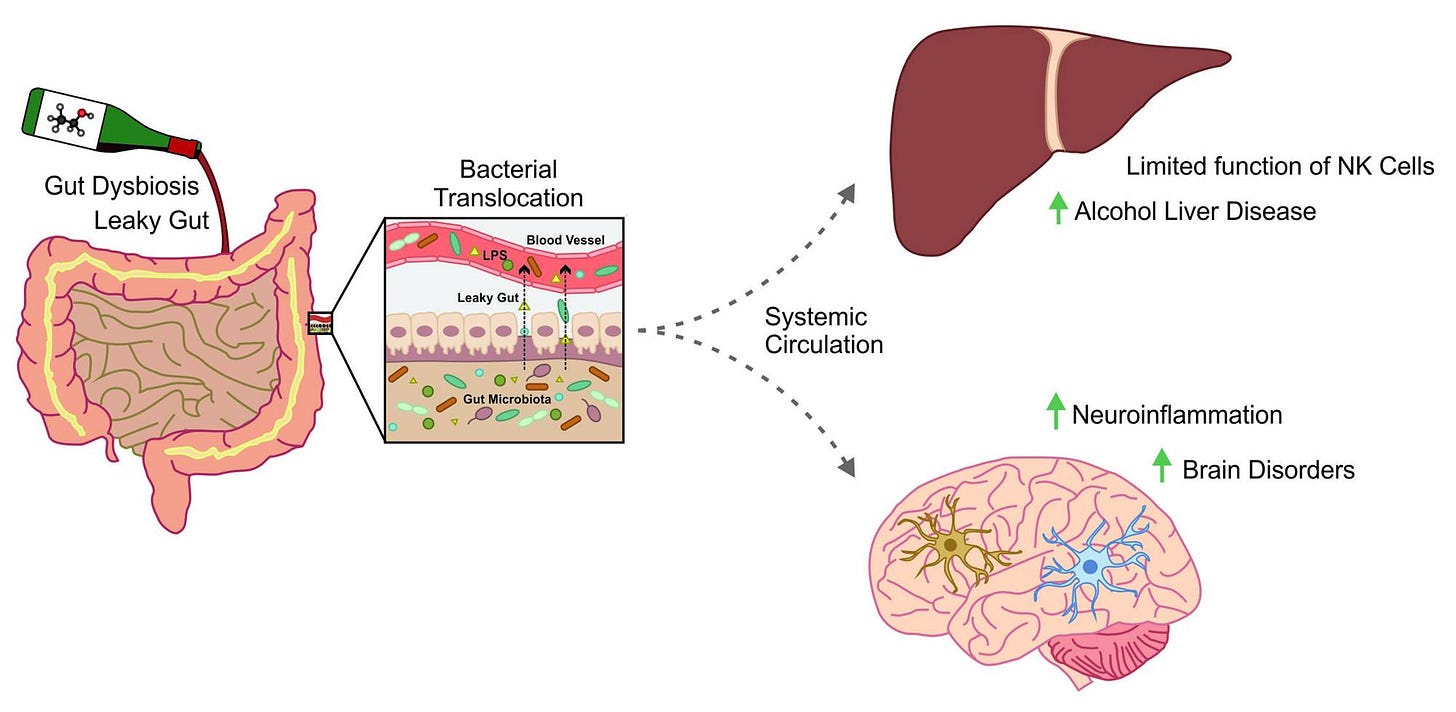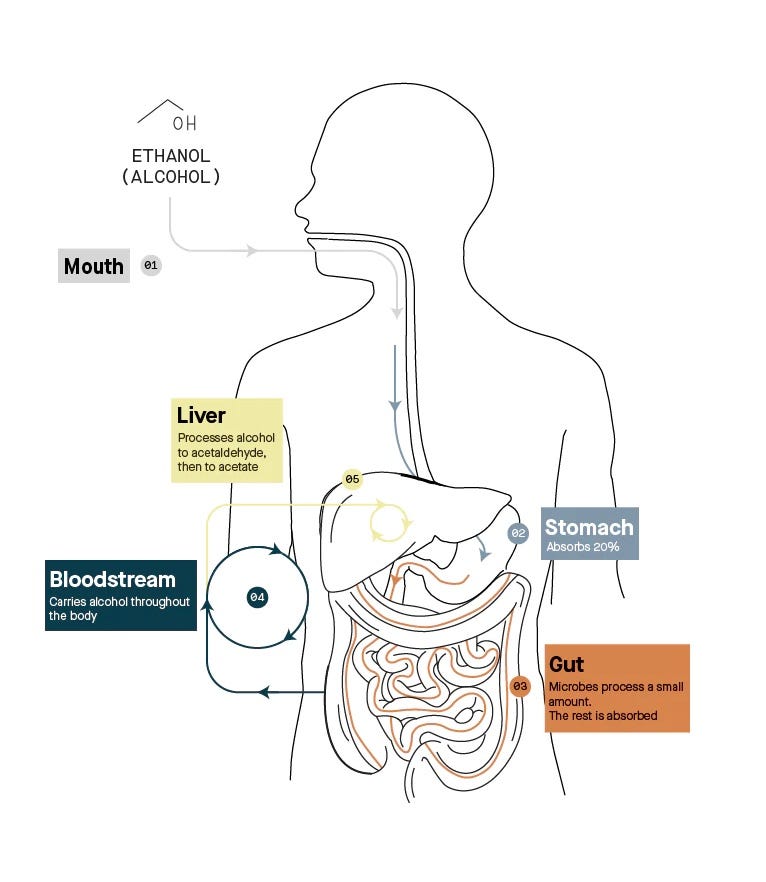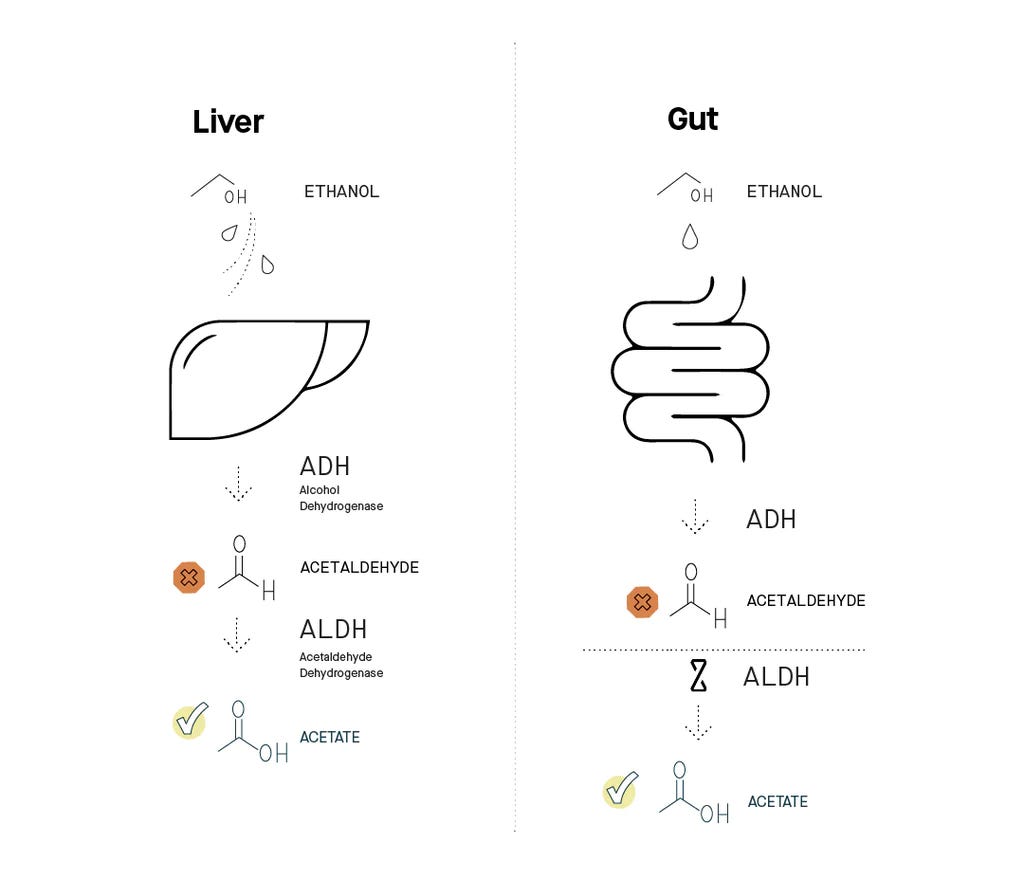Welcome 👋🏼
Welcome to the first edition of Resonant Frequency, where I’ll be writing at the intersection of health, wellness, tech, and all things bio (e.g. biotech, biohacking, and bioremediation). I hope it entertains and delivers value to you.
Today’s post is about a topic near and dear to my heart: alcohol consumption, its toxic burden, and a modern breakdown on what you can do about it.
First — I’m a firm believer that choice and balance are essential to overall wellness. While the science is clear that there’s no health benefit to drinking, and many negative health effects, people choose to drink for many reasons. I’m not here to tell you not to drink.
What I am here to tell you is:
What happens in your body after throwing one back
What you can do to lessen the toxic burden of alcohol and prevent hangovers, including natural remedies and one incredibly effective biotech-powered remedy
Ethanol: A Most Common Toxin’s Journey
Ethanol, or ethyl alcohol, is the form of alcohol which we ingest when we drink, and is one of the oldest and most common toxins that humans are exposed to (and perhaps the most willingly consumed).
As ethanol makes it way through the body, it is converted into different molecules, each of which have different effects on various parts of the body.
The journey of alcohol begins in the gastrointestinal tract. After consumption, a small amount is absorbed directly via the tongue and mucosal lining of the mouth, and the rest travels to the stomach. In the stomach, some of the alcohol is processed in the digestive tract, and the rest is rapidly absorbed into the bloodstream, primarily through the lining of the stomach and small intestine.
Alcohol is both water soluble and fat soluble, which allows it to easily pass through cells in the gut to reach the bloodstream, and once it’s there, it circulates via the blood to the rest of the body in <2 minutes for the average healthy person.
This ability to reach your bloodstream from the gut, and rapidly distribute, is what results in the pleasant (or sometimes unpleasant) feelings of intoxication you experience during your first few drinks. The disorientation that you feel is a result of the body’s inability to immediately eliminate alcohol and its byproducts.
The rate of absorption of alcohol in the digestive tract can be influenced by several factors, including the presence of food in the stomach, the concentration of alcohol, and the type of beverage consumed (and what other compounds are present, such as sugar). Once absorbed, alcohol travels through the bloodstream to the liver, where the liver works to metabolize and eliminate it from the body.
The liver is the main site for alcohol metabolism, handling about 80-90% of consumed alcohol. The liver metabolizes alcohol using two key enzymes: alcohol dehydrogenase (ADH) and aldehyde dehydrogenase (ALDH). These enzymes break apart the alcohol molecule so that it can be eliminated by the body:
Alcohol Dehydrogenase Pathway: ADH first converts alcohol to acetaldehyde, a highly toxic and reactive compound. Acetaldehyde binds to proteins, DNA, and other molecules, causing cellular damage and impairing function, and also encourages the production of ROS (reactive oxygen species), which cause oxidative stress and further cellular damage.
The liver is the primary site of acetaldehyde exposure, but some of it makes its way to other organs and tissues, including crossing the blood-brain barrier and impacting the brain. It is a main contributor to hangover symptoms, and is especially destructive to DNA and the brain overall.Aldehyde Dehydrogenase Pathway: In the next step, ALDH converts acetaldehyde to acetate, a less toxic (but still disruptive) substance.
Acetate is then further metabolized to carbon dioxide and water, which the body can then eliminate.
The remaining 10-20% of ethanol not processed by the liver is metabolized in the digestive tract, or excreted unchanged through urine, sweat, and breath. In the gut, ethanol follows a similar metabolization pathway to the liver, converting first to acetaldehyde, and then to acetate, facilitated by both human gut cells and gut microbes.
The amount of ADH and ALDH enzyme activity one has depends on many factors, including genetics, sex, lifestyle, and frequency of alcohol consumption. Those who often have a red “glow” to their face when drinking or throw up after a drink or two tend to have a genetic predisposition to high ADH enzyme activity, low ALDH enzyme activity, or both, resulting in an increased accumulation of acetaldehyde (via more rapid conversion of alcohol into acetaldehyde, or slower conversion of acetaldehyde into acetate). This increased accumulation results in more internal damage.
In moderate drinkers, the metabolic processes above efficiently manage the alcohol consumed. However, in heavy drinking, the ADH pathway becomes saturated, and the body increasingly relies on an alternative metabolic pathway known as the microsomal ethanol-oxidizing system (MEOS).
The MEOS pathway, involving the enzyme cytochrome P450 2E1 (CYP2E1), uses NADPH and oxygen to metabolize alcohol to acetaldehyde and is responsible for the increased tolerance to alcohol observed in heavy drinkers. However, the activation of MEOS also leads to significantly higher production of ROS than the ADH pathway, contributing to excessive oxidative stress and cellular damage, particularly in the liver.
Alcohol’s Impact
While it might seem on the surface that our bodies are recovered from the harmful effects of alcohol after our hangover or general malaise wear off the next day(s) after drinking, or that a drink or two here or there aren’t causing measurable harm, alcohol is doing quite a bit of damage behind the scenes regardless of intake level.
Chronic intake of alcohol has been found to disrupt and damage the brain and other systems in the short and long term and contribute to cancer development, even at a lower intake of 7-14 drinks per week. That could be one or two drinks per night, or it could be a few drinks on Friday and a few on Saturday, or one big night of partying.
Heavier drinking causes even more damage, and what constitutes heavy drinking may come as a surprise. Binge drinking is defined as just 4 or more drinks on a single day or 8 or more drinks per week for women, and 5 or more drinks on a single day or 15 or more drinks per week for men.

Alcohol negatively impacts many of the systems in your body, but some of the worst offenders are:
Gut Damage: Alcohol is highly effective at killing bacteria, which makes it a great disinfectant but also means that it kills beneficial bacteria in your gut.
On top of that, it causes significant damage to the mucosal lining of the gut and disrupts the tight junctions between gut cells, increasing gut permeability (”leaky gut”) and allowing bacteria and toxins to enter the bloodstream.
This damage can lead to gastritis and ulcers in the long term, and is a known driver in systemic inflammation and immune system dysfunction, such as the development of food allergy and autoimmune disease.Increased Liver Burden: Acetaldehyde and ROS directly damage liver cells (which can lead to fatty liver, alcoholic hepatitis, and cirrhosis over time for heavier drinkers), but the additional burden of processing alcohol’s byproducts also diverts the liver’s resources away from its other critical daily functions (even for lighter drinkers), including:
The detoxification of environmental toxins (like heavy metals, industrial chemicals, and pesticides)
The processing of metabolic by-products (like cholesterol, fats, and hormones)
When we drink, we reduce our body’s ability to process and recover from the ever-increasing toxic load of modern living.Vitamin and Mineral Loss (Including Electrolytes): Alcohol’s damage to the mucosal lining of the gut reduces the absorption of nutrients like thiamine, folate, vitamin B12, and zinc.
It also promotes diuresis, leading to increased excretion of electrolytes like sodium, potassium, and magnesium (which many of us are already deficient in due to soil depletion and modern lifestyles).
Neurotransmitter Imbalance: Alcohol induces a temporary and acute increase in serotonin, dopamine, and endorphin levels, leading to temporary mood elevation.
Chronic use (even a handful of drinks per week) results in repeated serotonin and dopamine release, disrupting the balance of those and other neurotransmitters and depleting serotonin in your brain over time.Accelerated Aging: ROS, being highly reactive molecules, cause damage to cells all over the body including the cardiovascular system and immune system, and lead to accelerated aging when chronically elevated.
Poor Sleep: Even just one drink, such as a glass of wine or a beer, disrupts your sleep. Deep sleep (slow-wave sleep) and REM sleep are considered to be the most restorative sleep phases, and both are particularly impacted by alcohol.
You may feel like you’re able to fall asleep more easily after a drink, but a significantly larger portion of your night of sleep will be spent in light sleep.
Not getting enough deep sleep and REM negatively impacts nearly every system in your body, especially cognitive abilities like processing speed, memory, learning, and decision making.
Alcohol also relaxes the muscles of the throat, which can worsen (or cause) breathing problems during sleep, such as snoring and obstructive sleep apnea, further reducing sleep quality.Cancer: Acetaldehyde is a carcinogen. Ethanol and its byproducts contribute to cancer development through various mechanisms, including damage to DNA and protein, production of ROS which further damage DNA, and impaired ability to absorb essential nutrients.
The development of mouth, throat, esophagus, voice box, breast, liver, colon, and rectum cancers have all been associated with alcohol consumption.
It is also hypothesized that alcohol enhances the penetration of other carcinogens into cells by damaging cell membranes and acting as a solvent for them (dissolving and transporting them through the body).
Huberman (🎧 , ✍️) and many others have put together great in-depth explanations of the various effects of alcohol on the body if you’d like to learn more.
Traditional Detox and Aftercare
Most traditionally available hangover remedies and post-alcohol care focus on one or more of five primary areas:
Micronutrient Replenishment
“Hangover prevention” supplements such as Morning Recovery and Cheers often include a blend of vitamins and minerals meant to help replenish those lost or impacted by alcohol consumption, alongside other ingredients to provide support to detoxification pathways and anti-inflammatory action.
Critical nutrients to replace include vitamin C, vitamin B complex (with thiamine), zinc, and electrolytes like magnesium, potassium, and sodium.
Detoxification Pathway Support
The longer that ethanol and acetaldehyde spend in the body unprocessed, the more time they have to cause damage. Therefore, the faster and more efficiently that they can be broken down, and the more the liver can be protected and supported during that process, the less toxicity and hangover symptoms you will experience.
Milk thistle is an herbal supplement that supports the liver by acting as an antioxidant, neutralizing ROS, and protecting liver cell membranes.
L-cysteine has been found to directly bind to acetaldehyde, significantly enhancing the body’s ability to neutralize and eliminate acetaldehyde with fewer toxic effects and hangover symptoms.
Vitamin C’s antioxidant properties aid in detoxification and neutralization of ROS, especially when paired with L-cysteine, with which it has a synergistic effect.
DHM (dihydromyricetin) is a natural flavonoid found in the Japanese raisin tree, and it not only increases the amount of ADH and ALDH produced by the liver (resulting in better ethanol and acetaldehyde processing), but also binds to the same GABA-A receptors in the brain that alcohol binds to, reducing their sensitivity to alcohol and helping prevent some of the negative mental effects of a hangover, like anxiety, irritability, and withdrawal symptoms.
Gut Support
L-glutamine is an absolute powerhouse of a supplement for gut health, and one of my personal favorites even outside of alcohol consumption. It supports the gut microbiome and gut mucosal wall integrity, and also modulates inflammatory responses. All of these are negatively impacted by alcohol, and L-glutamine can be helpful in restoring the gut when consumed on a regular basis.
Probiotics, prebiotics, and fermented foods are also helpful in restoring beneficial bacteria, and are especially essential if regularly diminishing your gut bacteria via drinking.
Inflammation Reduction
Reducing inflammation has an alleviating effect on many common hangover symptoms, and supplements known to reduce inflammation, such as quercetin and alpha-lipoic acid (ALA) can be helpful.
Many people choose to take NSAIDs like Advil for a hangover for this reason. If you remember and implement anything from this piece: do not take NSAIDs (ibuprofen, aspirin, etc) after drinking. Or in general! Unless your doctor has advised you to do so of course. Every year, more research comes out on the destructive effect of NSAIDs on the gut and liver, both of which have already taken on damage after drinking.
Neurotransmitter Recovery
Activities that increase epinephrine, adrenaline, and dopamine, such as cold showers and moderate to high intensity workouts, help with some of the effects of a hangover and also help to restore neurotransmitters to normal levels. Avoid these activities if you are severely hungover or if you are potentially still intoxicated, as they can be dangerous.
ZBiotics: A Modern Approach To Detox
ZBiotics is a synthetic bio company that bioengineers probiotic bacteria for consumer nutraceutical use. Their first product is a probiotic beverage designed to help prevent hangovers.
It comes in a small bottle, to be drank before your first alcoholic drink, which contains a strain of Bacillus subtilis that has been genetically modified using homologous recombination DNA editing to produce an enzyme that breaks down acetaldehyde. This enzyme is the same type as the ALDH naturally found in your liver and in smaller amounts in your gut, and Bacillus subtilis is found in fermented foods like Korean kimchi, Japanese natto, and Egyptian kishk.
TLDR: ZBiotics boosts the existing acetaldehyde metabolization process in the digestive tract, significantly reducing hangover symptoms and toxicity.
Since ZBiotics’ product is consumed as an oral probiotic supplement, the ALDH enzyme its bacteria produce is produced in the gut, where it can effectively break down acetaldehyde that has accumulated there. Certain gut microbe strains commonly found in our microbiome naturally produce ADH, converting ethanol to acetaldehyde, and many of those same strains also produce ALDH, converting the acetaldehyde to acetate, but in small amounts.
What this means is that while your microbiome can convert ethanol to acetaldehyde on its own, it is not as efficient at converting that acetaldehyde to acetate, leading to an accumulation of acetaldehyde in your gut and bloodstream.
This is only a portion of the acetaldehyde processed in your body when drinking, but the inability of the gut to handle the amount of acetaldehyde that comes with even moderate drinking results in significant damage and an outsized contribution to hangover symptoms.
ZBiotics augments your body’s ability to break down acetaldehyde in the gut and greatly reduces hangover symptoms and the less perceptible damage being done to your body internally.
Are there downsides?
Given that ZBiotics uses a strain of bacteria commonly consumed in fermented foods, and the enzyme it produces is already found in the gut, the risk profile appears to be low.
Further, most probiotics on the market, including ZBiotics, are transient (non-colonizing), meaning that they pass through your gastrointestinal tract, produce effects, and do not become a permanent fixture that alters your existing microbiome composition.
It is technically possible to colonize bacteria using transient probiotics — I personally have been able to re-colonize certain strains from other probiotics, but it took significant effort and targeted supplementation on top of consuming the probiotic itself.

ZBiotics is one of my all time favorite companies, part of a new class of products bridging the gap between biotech and wellness by bringing bioengineered products directly to consumers, and solving for wellness vs pursuing a more traditional pharma route of targeting disease.
Their team plans to release additional products, with product #2 in the gut health and microbiome realm. Future products will utilize their underlying platform and leverage our existing relationship with bacteria to improve our wellbeing, by enhancing human physiological capabilities and giving us mini superpowers for modern living. 🧪
Closing Thoughts
ZBiotics and the other products and approaches above solve for only a portion of alcohol’s impact and toxicity. No product solves for every issue, especially things like alcohol’s destructive effect on gut microbes and mucosal lining, its histamine inducing effects, and potential reactions to other ingredients in alcoholic drinks, such as tannins.
However, ZBiotics, electrolytes, and water will take you a long way, and have had enormous impact for friends who are regular drinkers. I rarely drink personally, but if I do, I use a combo of: ZBiotics, milk thistle, L-cysteine, DHM, electrolytes, and water, along with daily supplementation with probiotics, fiber, and L-glutamine for general gut health.
🧬 Here’s a link for $20 off of ZBiotics for your convenience. Nothing in this post is sponsored nor is it a revenue stream for me.
💊 If you’d like recs on any particular supplements, please reach out! Many supplements on the market (especially some of the most common or popular ones) are of poor quality, poor efficacy, and/or contain harmful filler ingredients.
🍷 There are also a number of excellent non-alcoholic replacement drink options available that are great alternatives for some of the flavor, habit, and/or social elements of drinking, like: Cann social tonics, Surely wines, Ghia apéritifs, Seedlip spirits, and Aplós spirits.
📣 If you have any hot takes, weird health rabbit holes you’ve been going down, or want to chat re: bio-powered products, biohacking, supplementation, detoxification, nutrition, etc, hit me up!
That’s all for now — I wish you well in your drinking and non-drinking endeavors. 🙏
Natasja









ive never been so influenced so quickly in my life
A great deep dive into the mechanism/pathway! Fascinating!